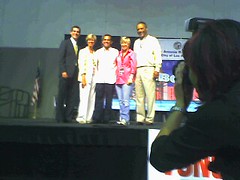- Build power through knowledge. Bring the Government 101 curriculum to your community and teach your constituents how City Hall works. Start a Neighborhood Leadership Institute and bring some of the city wide curriculum we have developed (Planning 101, Planning 102, Planning 103, Housing 101, etc.) to your neck of the woods. These graduates will help your neighborhood have a more powerful voice throughout the city.
- Use a blog to communicate with your constituents. Every community has people who serve as information hubs, who follow new development projects and who know the local goings-on. Recruit them as bloggers for your neighborhood council. People get involved and stay engaged when they can find regularly-updated information about the community. In Echo Park, where I live, the revitalized Echo Park Net is a great example.
- Welcome new residents to your neighborhood and get them involved. Welcome-packs are a great way to introduce new residents to your neighborhood. Work with all of the local realtors in your neighborhood council area to put together critical information and useful tips, including how to access city services, a guide to local businesses, and your council’s Neighborhood Emergency Operations Plan (see number 9 below).
- Empower young people in your community. If you do not already have a youth representative on your neighborhood council, get one! Adopt a local school and work with the social studies or leadership teachers to help identify or elect a student representative on your council.
- House Los Angeles. The housing crisis in Los Angeles is the worst in almost sixty years. Less than 10% of Angelenos can qualify for a mortgage on the average-priced home in Los Angeles. Consider endorsing the principles of a $1 billion housing bond for the ballot in Fall 2006. Visit www.homesforlafamilies.org for more information.
- Clean up your neighborhood. Bring UNTAG (Uniting Neighbors To Abolish Graffiti) to your neighborhood. This initiative reduced graffiti by 62% in a single year in CD13 and can work in your neighborhood, too. We recently expanded this program to go citywide, and all we are waiting for is you. Visit http://www.lacity.org/council/cd13/untag.htm for more information.
- Clean up your city. Los Angeles has the country’s dirtiest air and water. We consume disproportionate amounts of resources and contribute to global warming. Assess your own neighborhood by measuring your environmental footprint at http://www.myfootprint.org and see what you can do to reduce your footprint. Work with the Bureau of Sanitation to see if your neighborhood might be ripe for a project to clean your neighborhood’s water through Proposition O. You can clean the water and beautify your neighborhood at the same time.
- Clean up your government. Join the Clean Money Campaign to take special interest money out of politics. By implementing a full public financing system for municipal elections, Los Angeles can join other states and cities around the country that are returning democracy back to our communities. For more information, visit www.calclean.org.
- Prepare for emergencies. Prepare a Neighborhood Emergency Operations Plan. Neighborhood Councils will be on the front lines of responding to any emergency situations in the city or in their communities. Work with the Emergency Operations Department and DONE to develop a 21st-century phone tree to help communicate with your constituents during an emergency. Be prepared!
- Make policy. Help get final passage of the proposal to trigger the opening of council files when a critical number of neighborhood councils weigh in on policy proposals. This will help open a new chapter in neighborhood empowerment and build on many of the policy successes initiated by neighborhood councils, from cable policy to water rates.
Thursday, June 22, 2006
Ten Things Neighborhood Councils Can Do for Los Angeles
I had originally thought to address the Congress of Neighborhood Councils with a speech about ten things the city could do to improve the neighborhood council system. But as the meeting unfolded, I quickly became aware that I was in a room full of people who didn't want my assistance—they wanted to lead. So I turned my speech on its head: here are the ten challenges I presented to the city's growing neighborhood council movement. Neighborhood council leaders, I think you're up to the tasks.
Posted by
lacityorgcd13
at
6:03 PM

